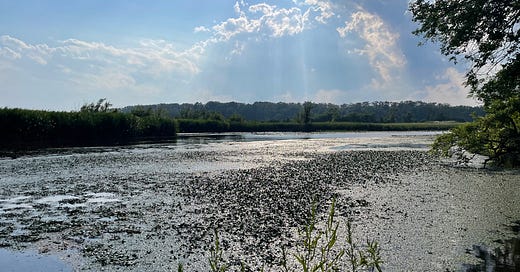I suppose it was inevitable that I’d arrive here, at an impasse, not knowing what to say, wanting to flee the blank page. Maybe it’s the travel (from Argentina to New York’s Hudson Valley, where I am now). Or maybe it’s the view. I’ve rented a cabin by the river. The idea was to have a little writing retreat in advance of an annual family reunion; crank out a couple of these installments as a cushion.
The place is perfect, except for the annoyingly spectacular view. Frederic Edwin Church in heaven wishes he had painted this while he still had the chance. But I’m finding it hard to get anything done. The Hudson River has me under some kind of spell. I can’t look away: perfect stillness in constant motion, implacable peace, Buddha with shipping lanes. Who can work in these conditions? Of course, I could just lower the blinds. But that won’t solve anything. Because the problem is not the view. The problem is that I would very much like to lower the blinds. And by that I mean drink.
It’s the old dynamic. A bit of internal pressure arises, a certain discomfort, both psychological and physiological. Let’s call it craving. It shows up as a response to some kind of psychic frustration, usually in the context of creative work. Right now, that creative work is the very piece you’re reading. My week hasn’t gone as planned. I’ve come up empty. There were some false starts. Perhaps I made a strategic error in spending this much money and calling it a “writing retreat”. Better be worth it. Pressure’s on.
Sure, I could probably find something—an alt-mix, a demo, a poem. But that feels like grasping for content. And I wonder if the very fact of coming up empty might be the better way to go. What if I embrace this moment of dis-ease? Write through it by writing about it. What would that look like? Exactly like this, venturing into open space, word by word, where every step is a decision and commitment, down to something as innocuous as, say, whether I should’ve used the word “innocuous” just then. In other words, other words. Anxiety appears. I might get it wrong. From there, it’s off to the races, where the track is a negative feedback loop.
Of all the things I could venture to say here, “I’m not the first writer to feel this way” seems like a fairly safe bet. So much of writing is discovery, finding out what one thinks, has to say. But writing also means being able to tolerate the uncertainty, doubt, frustration and fear that can precede discovery (when, praise be, it happens). But my threshold is low. Even when it’s going well, even when I’m doing this thing I love to do, I want to escape. Why is that?
It has to do with the way alcohol attached itself (or I attached it) to my creative process when I began writing songs in the late 1980s. When I found that purpose, and all of the meaning and identity formation that came with it, drinking did too. It was no longer just a matter of getting drunk. Now it was serving a noble mission. The relationship was symbiotic. Alcohol seemed to help with the writing. Writing returned the favor by justifying and condoning the alcohol. Then, in another of the many perverse, self-deluded twists in this saga, whenever I didn’t feel like writing, the bottle would provide an incentive. Wine as reward.
Right now, at 11 am, on my second cup of coffee and with the whole day in front of me, a little creative friction will not send me scrambling for a drink. Besides, I’ve never been a daytime drinker (a detail which kept me from recognizing my alcoholism sooner). But the mere fact of knowing there’s a bottle or two of wine in my immediate future gives a certain shape to the day. Even from seven hours away, a bottle speaks loud and clear: help is on the way, where “help” means hope (for those twenty usable minutes of creative loosening, relief, release, abandon), followed by entitlement (reward, celebration) and finally stupefaction (resignation and an early lowering of blinds).
The dis-ease is acute. Without that certain shape (or shape of certainty), I have to live with this wide open page, myself as I am, things as they are: unsettled, unresolved. I feel it as a visceral, palpable lack. The Buddhists call it duhkha. I hear there’s a cure. Today I’m not drinking. The blinds are up. There is no bottle on the horizon. And the page is not, as I said at the top, “blank”. Wrong word. Open is better.






I’ve been sober for a little over 8 years. For me, the heart of sobriety is learning how to “ tolerate the uncertainty.” One of the more attractive things about drinking for me was the complete certainty that it would “work”: silence the inner voices, erect a gossamer curtain between me and the rest of the world, take away my constant apprehension of doom, soften the jagged edges of shame, and on and on.
You’ve also perfectly described one of the great pitfalls of sustained sobriety: self-expectations. Over and over, I started drinking again because I somehow failed to live up to a version of myself that existed only in my head.
By sharing these deeply personal experiences and thoughts, you helped me understand myself better. You have given me permission to be flawed. When one alcoholic opens their heart up to another, miracles happen. Thank you.
What a beautiful gift you have given us all this morning! Your courage to sit with these feelings, to write about them and to share them - sends hope and connectivity, helps some of us feel less alone. Thank you for your honesty. And for continuing to share your gift of writing.